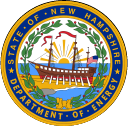Pipeline Safety Inspection Program
New Hampshire incorporates 32 versions of Inspections for Transmission Operators, Distribution Operators, LPG Operators, Landfill Gas Operators and Master Meter Operators.
These inspections are conducted over various intervals ranging from one to five years. When aggregated, the inspection forms are designed to verify overall compliance with federal regulations, applicable state rules and applicable Commission Orders.
Types of Inspections fall into three main categories:
- Site Specific Field Inspections
- System Wide Program Inspections
- Targeted Inspections/Investigations
New Hampshire’s Inspection process consist of the following elements for each inspection type:
- Thorough pre-inspection which may involve acquainting oneself with the procedures anticipated to be used for the type of activity that is being inspected. Reviewing an operator’s specific expectations regarding documentation that the operator requires to be recorded is an important first step of a successful inspection. Another important activity prior to meaningful inspections includes conferring with fellow inspectors of previous inspection results. Pre-inspection routines also include familiarization of applicable guidance material, prior history of inspections and compliance actions for that operator.
- On-site field monitoring or monitoring of work centers to see if operator’s procedures are being followed and that they are consistent with ensuring compliance with 49 CFR Part 192, 49 CFR Part 193, or Puc 500 regulations and overall safe design, construction, operations and maintenance is another important element.
- Review of Operator documentation to ensure compliance with Part 192 and Puc 500 regulations that provides sufficient evidence that a procedure was accomplished in a safe manner. Proper documentation allows for future tracking capabilities and incorporation into an operator’s knowledge base of pipeline components used, construction techniques employed, and operation and maintenance practices used. This portion of the inspection may be done in the field or later during a separate work center inspection. The Safety Division has the right to request copies of any procedure, record, map, policy or like material that is available and determine when they should be submitted (i.e. prior to end of visit, end of day, end of week or other appropriate time) as long as the request is justifiable and requires feasible and achievable responses.
Inspections may take place at any reasonable time and location. A “reasonable” time typically would be considered working hours on regular workdays but could also include occasional inspections on weekends, holidays or night shifts. Inspectors may examine the records and properties of persons to the extent such records and properties are relevant in determining Commission order or rule compliance.
Inspections may be based upon the following: routine scheduling, a complaint received from a member of the public or any party, information obtained from a previous inspection, a pipeline accident or incident and whenever scheduled by the Commission. Distribution operators notify the Safety Division each morning of crew locations and pipeline work activities.
Inspections can be either scheduled or unscheduled, that is, unannounced inspections. Scheduled inspections typically involve visits to pipeline operator facilities to interview managers, examine records or inspect specific facilities. Unscheduled inspections are usually field visits to construction, repair or incident sites. Scheduled inspections are most appropriate for Integrity Management Inspections, Operator Qualification Program Inspections, Control Room Inspections, Public Awareness, and other program inspections where a complete and thorough review is necessary. These are often performed as a team of inspectors. The inspection team typically has assigned a lead based on completed training and expertise of the subject matter.
Unlike PHMSA, New Hampshire does not use an Integrated Inspection process in which some operators may not necessarily receive a full inspection. Such an approach is not necessary within New Hampshire based on the number of operators, inspection units, and the amount of pipelines measured against applied inspection resources. For more information on inspections types see PHMSA’s Inspection Type Glossary and PHMSA’s Pipeline Safety Inspection websites.
New Hampshire Inspection Modules
- Operator Qualification Plan, (Former Protocol 1-8)
- Transmission
- Distribution
- LPG
- Landfill
- Operator Qualification Field Review (Protocol 9)
- Transmission
- Distribution
- LPG
- Landfill
- Gas Utility Distribution Standard Inspection
- Distribution
- Evaluation Report of Gas Pipeline Construction
- Transmission
- Distribution
- Welding Procedure Inspection
- NH
- Transmission
- Distribution
- Plastic Main Construction
- NH
- Distribution
- Plastic Service Construction
- NH
- Distribution
- Leak Survey/Patrolling
- NH
- Transmission
- Distribution
- Comprehensive Corrosion
- NH
- Transmission
- Distribution
- Regulator Station & Relief Valve
- NH
- Transmission
- Distribution
- LNG Siting, Design, Construction, Equipment
- Distribution
- LNG Comprehensive
- Distribution
- Liquid Natural Gas Plant
- Distribution
- Uprating/MAOP Inspection
- NH
- Distribution
- Underground Damage Prevention
- NH
- Transmission
- Distribution
- Odorization
- NH
- Transmission
- Distribution
- LPG
- Landfill
- Steel Main Construction
- NH
- Distribution
- Steel Service Construction
- NH
- Distribution
- Line Marker
- NH
- Distribution
- Critical (Key) Valve
- NH
- Distribution
- Integrity Management (Transmission)
- Distribution
- LPG
- Landfill
- Master Meter
- PHMSA GT IA Integrity Management Question Set
- Transmission
- Integrity Management (Distribution)
- Distribution
- LPG
- Landfill
- Master Meter
- Drug & Alcohol (Short Version)
- Transmission
- Distribution
- Drug & Alcohol Comprehensive
- Transmission
- Distribution
- Failure Investigation
- Transmission
- Distribution
- Control Room Management
- Distribution
- Public Awareness
- Transmission
- Distribution
- LPG
- Landfill
- Master Meter
- Master Meter Comprehensive/Records
- NH
- Master Meter
- Landfill Records
- NH
- Landfill
- Propane Facility
- NH
- LPG
- Propane Records
- NH
- LPG



